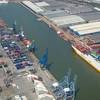US Election Awash with Maritime Implications
With a critical election fast approaching – in which the Executive Branch, House and Senate are all up for grabs – it is essential to consider the election’s potential impact on the maritime industry before heading to the voting booth.
Maritime impact on the election
At the time of writing, we are two weeks away from the expiration of the current six-year master agreement between the United States Maritime Alliance (USMX) and the International Longshoremen’s Association (ILA) with no new agreement in sight. ILA’s leadership has made it clear that their members are prepared to stop work at ports along the East and Gulf Coasts if an agreement is not reached before the October 1 deadline.
The potential ILA strike places the Biden Administration – and in turn the Democratic nominee, Vice President Kamala Harris – in a challenging position. As the deadline approaches, the Administration is increasingly faced with the question as to whether they will invoke the Taft-Hartley Act. Under the Act, the President can direct the Attorney General to obtain an injunction from federal court, arguing that the ILA strike could imperil national health or safety. Under such injunction, the USMX and ILA would be subject to an 80-day colling offer period during which time ILA workers would be required to continue working, giving the sides additional time to reach an agreement. President Bush invoked the Taft-Hartley Act in 2002, following an 11-day International Longshore and Warehouse Union strike, following the expiration of the union’s master agreement with the Pacific Maritime Association.
Invoking the Taft-Hartley Act is strongly opposed by the ILA, and would be viewed as an action against labor union interests. On the other hand, a strike could impact the U.S. economy, including the flow of consumer goods, depending on how long it lasts. Moreover, a strike would likely create negative media coverage, and validate voter perceptions of weakened economy, potentially costing Vice President Harris critical votes. As such, the ongoing USMX-ILA negotiations have increased in importance, going far beyond the waterfront to potentially impacting the votes of numerous Americans.
A new Merchant Marine Act
In the background of the election is perhaps the most important piece of maritime legislation in the last fifty years. Led by Senator Mark Kelly (D-AZ), the bill aims to rebuild the U.S. maritime industry (literally and figuratively) through the investment of billions of dollars in U.S. shipbuilding and support for U.S.-flag vessels in international trade, amongst numerous other provisions. The legislation builds upon the April 2024 bipartisan, bicameral Congressional Guidance for a National Maritime Strategy, issued by Senator Kelly, Senator Marco Rubio (R-FL), Rep. Mike Waltz (R-FL-6) and Rep. John Garamendi (D-CA-8). In the guidance, the Congressmen asserted that “[d]ecades of neglect by the U.S. government and private industry has weakened our shipbuilding capacity and maritime workforce, contributing to a declining U.S.-flag shipping fleet to bring American goods to market and support the U.S. military during wartime.”
Sen. Kelly’s legislation takes direct aim at reversing this neglect, to help counterbalance the strategic influence of the People’s Republic of China in the maritime domain. While Senator Kelly is looking to introduce the bill in the current Congress, it is unlikely that any action will be taken until after the election in the next Congressional session. As such, the next Congress – undoubtedly including many rookie Congressmen whose views of the U.S. maritime industry are unknown – may be tasked with considering the most important maritime support bill since the Merchant Marine Act of 1970. It took 54 years support bill of this magnitude to develop, and another bill of this importance may not develop for another 54 years. As such, this election will have lasting impacts for maritime stakeholders, as the bill’s success could lead to a revitalization of the U.S. maritime industry and its failure could result in the industry’s continued neglect lamented in the Congressional Guidance for a National Maritime Strategy.
House and Senate balance of power
Directly related to the consideration of the Senator Kelly’s bill is the potential rebalancing of power in both chambers of Congress. Democrats are seeking to retake control of the House that they lost two years ago, while Republicans seek to regain a majority in the Senate for the first time in four years. Of greatest interest are control of the committees with direct jurisdiction over the maritime industry - the House Transportation and Infrastructure Committee (House T&I) and the Senate Committee on Commerce, Science and Transportation (Senate Commerce). Both committees have jurisdiction over the U.S. Coast Guard (USCG), Maritime Administration (MARAD), Federal Maritime Commission (FMC) and certain aspects of the U.S. Army Corps of Engineers, among numerous other federal agencies.
If the Senate were to flip, Senator Ted Cruz (R-TX), would likely assume the role of Chair of Senate Commerce (assuming he wins reelection). Sen. Cruz’s record of supporting the U.S. maritime industry is spotty at best. While he has strongly supported streamlining MARAD’s review process for deepwater ports, to increase crude oil exports, he has advocated for defunding MARAD’s Port Infrastructure Development Program, which provides critical federal funding to improve the safety, efficiency and reliability of the movement of cargo through U.S. ports. Similarly, Sen. Cruz’s record on the Jones Act is concerning, including his support for an amendment to the Coast Guard Reauthorization Act of 2019, which would have greatly expanded the availability Jones Act waivers.
If the Democrats seize control of the House, leadership of the House T&I Committee is less clear. Ranking Member Rep. Rick Larsen (D-WA-2) may seek the chairmanship, which would be welcome news for the U.S. maritime industry. Rep. Larsen has been a staunch advocate for all sectors of the maritime industry, providing vocal support for the Jones Act, and critical support programs, such as the Maritime Security Program.
Presidential impact
Of course, any discussion of the election’s impact would be incomplete without consideration of the next President’s impact on the maritime industry. Vice President Harris received early support from the Seafarers International Union and has been working steadily to build support from the rest of the maritime base. Toward the end of his term, President Trump similarly courted maritime interests, as his Administration’s Buy American, Hire American report issuing before the election stated that the Jones Act “helps ensure America has a robust domestic shipbuilding capability, which is a critical element of our defense industrial base” and “helps ensure our nation has a merchant marine work force sufficient to serve both our commercial and military needs.” However, the real impact of the next President on the maritime industry will not be revealed until they begin the nomination process, filling critical positions that impact maritime stakeholders on a daily basis, such as the Secretary of Transportation, Secretary of Homeland Securit, and the U.S. Maritime Administrator. Accordingly, even when the election ends, numerous questions about its ultimate impact on the maritime industry will remain unanswered.














